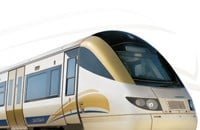The Cabinet's decision to cap toll fees rather than abandon them on Gauteng's freeways is a blow to public transport as a viable alternative to private vehicles.

(Image: Gautrain website)
The Gautrain, in particular, is unlikely to benefit from Wednesday's announcement that the Treasury would allocate R5,75bn to the South African National Roads Agency (Sanral), enabling it to cap tolls fees at R550 a month.
Earlier this year the Gautrain Management Agency, a provincial government agency that manages the project, warned that scrapping tolls would harm passenger numbers on the train.
Assumptions about the viability or the attractiveness of the Gautrain may have changed over the past decade, but there has always been an argument in favour of it.
Before the freeway improvement project started, the Ben Schoeman highway between Johannesburg and Pretoria grew ever more congested. Commuters could spend up to three hours in traffic on a return trip.
Take the train... or car?
With about R30bn spent on the freeway network since 2007, travel times between the two cities have fallen dramatically.
However, while the highways are considerably better, it was always just a matter of time before they stopped being free - tolling was originally slated for implementation last April. When forced to decide between paying tolls or buying a train ticket, consumers may well have chosen the train.
Gauteng, as part of the agreement it has with the Bombela Concession Company which built and operates the train, is obliged to subsidise the company until the service reaches a certain level of profitability.
Management agency CEO Jack van der Merwe said last month that the existing model for passenger demand showed the province would likely have to provide subsidies for at least the next six years. In the coming year the agency has budgeted to pay Bombela R300m.
Potential revisions to the passenger-growth-and-demand model - as a result of the toll reduction - will now extend the six-year subsidy window. Project spokeswoman Barbara Jensen says the studies, commissioned a month ago, are not yet complete.
Independent transport analysts on Wednesday said the state had found a balance between tolls and consumer relief. The retention of tolling underlined the state's commitment to a user-pays principle to fund transport infrastructure.
A need for some 'pretty fancy footwork' coming
However, transport analyst Paul Browning warned on Wednesday that in the "weeks and months ahead, the Gautrain and the province are going to have to do some pretty fancy footwork". Toll fees have been reduced "to a level that it causes a significant problem for the Gautrain," Browning said. "All they can do at this stage is keep quiet and wait for the storm to pass," he said.
The advantage of using the Gautrain had been reduced "considerably", Browning said.
According to the Gautrain website, a 35-day train pass for the journey between Pretoria and Sandton is R1435, while MidrandRosebank costs R923.
However, for road users, aside from the R550 capped toll, there are also vehicle running costs. Browning said the cost difference between using the train and the roads was still significant.
Tolling has been delayed three times since last April, with opposition to tolls reaching fever pitch late last year. The Congress of South African Trade Unions (Cosatu) is calling for road users to boycott the system and the issue of tolls is on high on the agenda for a national strike the labour federation has proposed next month.
Wanted: A dedicated road fund
Business groups such as the Southern African Vehicle Rental and Leasing Association and the Automobile Association are asking the state to abandon tolling in favour of creating a dedicated road fund capitalised by taxes already levied on fuel sales.
The Democratic Alliance on Wednesday threatened to take legal action against the Department of Transport if it pursued tolling.
The government is adamant tolling is here to stay.
Last week on Thursday, Cabinet spokesman Jimmy Manyi told reporters in Cape Town that the implementation of tolls is "not just a bad dream; it's a reality, it's going to happen".
National Treasury could no longer carry the burden of freeway maintenance, he said, warning those who chose not pay tolls that the "law will take its course".
SA has an estimated road investment backlog of R149bn. Moreover, the country can expect to see more tolling in future.
The N1/N2 Winelands project, the N2 Wild Coast project and the second phase of the Gauteng Freeway Improvement Project were all being assessed, Finance Minister Pravin Gordhan said this week.
Source: Business Day via I-Net Bridge




























